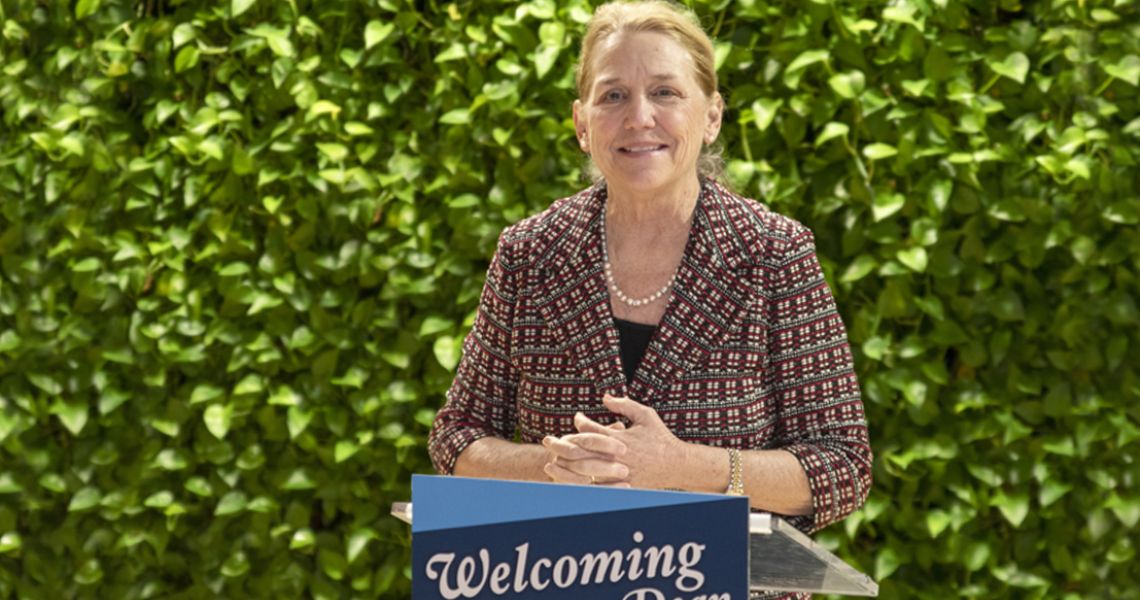With steadfast strength and conviction, Barbara L. Bass, MD, RESD ’86, vice president for health affairs and dean of the George Washington University (GW) School of Medicine and Health Sciences (SMHS) and CEO of The GW Medical Faculty Associates (GW MFA), is leading the institutions through two historic events that will forever shape the future of the United States.
Just weeks after Bass’ Jan. 15 arrival on the Foggy Bottom Campus, as she began meeting with school leaders and students, COVID-19 trekked around the world, from Asia to Europe, the Middle East, and the shores of the United States.
A few months later, the country still grappling with the threat of the virus, George Floyd was killed while in police custody in Minneapolis, Minnesota, setting off a firestorm of protests and vigils demanding racial justice in America.
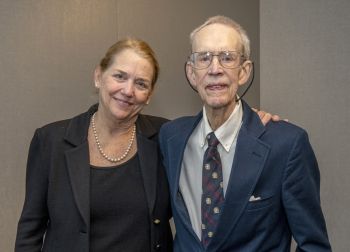
Bass, a GW-trained surgeon, is facing both crises head on, relying on the wisdom and compassion that has guided her throughout her career as a medical professional, and on the deep well of expertise from GW leaders, faculty, and staff.
“I could never have imagined that this is what my first few months at GW would look like,” Bass says. “It’s extraordinary to look back at the expectations I had for myself, for SMHS, and for the MFA and see how much they’ve changed. But I could not have asked for better colleagues to help me shape our response and shape the future of our institution. I’m clearly not an expert in everything … so I want and need to tap into the vast wisdom here. I’m a believer in learning from others, and I also believe in empowering others.”
Bass is the first woman to serve as dean of SMHS and the first person to hold the titles of both dean of SMHS and CEO of the GW MFA. That dual role is more important than ever as the institutions, along with GW Hospital, continue to serve patients suffering from COVID-19. As the virus spread throughout the U.S., and hit the D.C. area especially hard, Bass acted quickly and decisively, understanding that communication and transparency are of utmost importance.
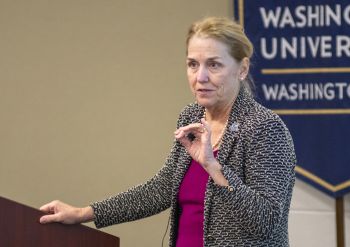
On March 11, the dean led the first in a series of town halls to discuss the clinical aspects of COVID-19, as well as its impact on operations at SMHS, from telework options for faculty and staff to a shift to online learning for students. At her side was a panel of top GW experts, including William Borden, MD, chief quality and population health officer at GW MFA; Bruno Petinaux, MD, chief medical officer at GW Hospital; Pamela Jeffries, PhD, dean of the GW School of Nursing; Lynn Goldman, MD, MPH, dean of the Milken Institute School of Public Health at GW; and Scott Burnotes, associate vice president for safety and security at GW.
Since that first town hall, Bass has held and participated in many other forums and webinars to keep faculty and staff aware of changes regarding operational status at GW and SMHS, and answer questions. Bass also has served on panels for the local Washington, D.C., area community and the university at large, assessing preparedness and COVID-19 response.
As the death of George Floyd unleashed a call for change across the country, Bass and the SMHS Office of Diversity and Inclusion responded with a new initiative, the Anti-Racism Coalition. The coalition will be headed by Yolanda Haywood, MD, senior associate dean for diversity, interim senior associate dean faculty affairs, and associate dean for student affairs at SMHS, in an effort to make anti-racism part of the fabric of the culture at SMHS and the GW MFA.
Haywood will co-lead the coalition with Karen Williams, MD, former chief of anesthesiology at the National Institutes of Health and retired associate professor of anesthesiology at SMHS. Grace E. Henry, EdD, director of the Office of Diversity and Inclusion at SMHS, and Taylor Smith, diversity officer in the Office of Diversity and Inclusion at SMHS, will also work to bring the coalition to life.
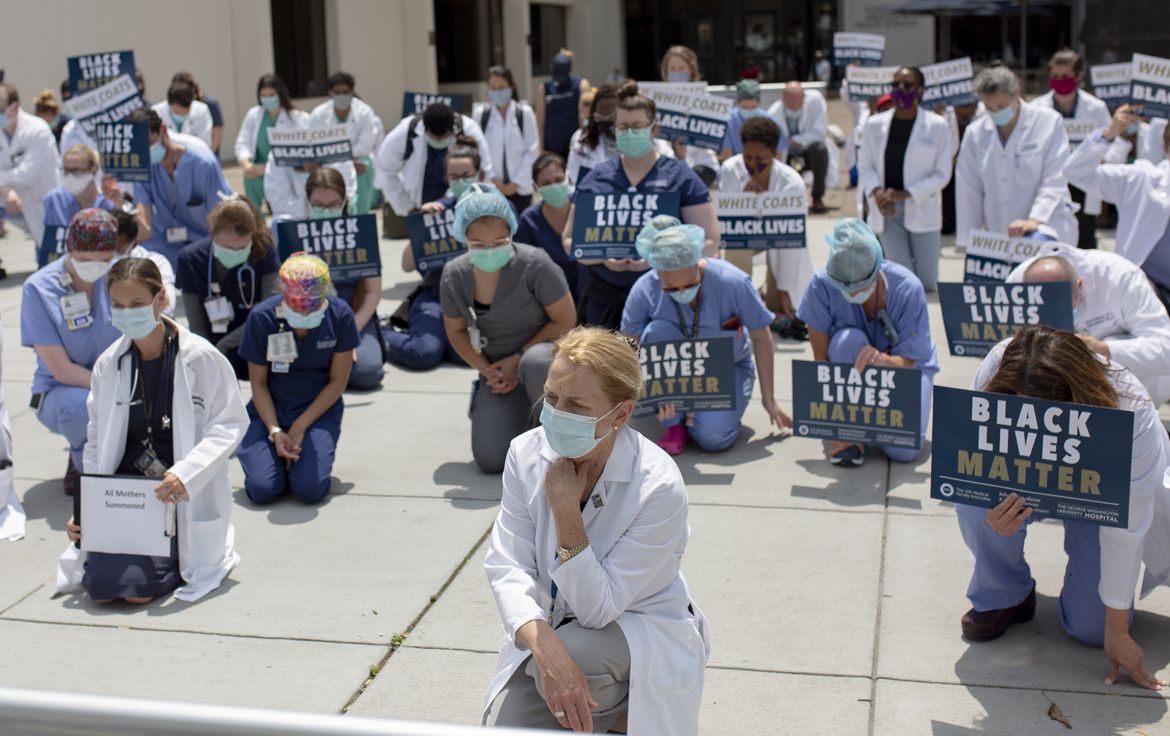
“We call on each of you to personally commit to supporting the goals of justice and equity for all of our citizens in all aspects of their lives, so that all may enjoy the freedom and opportunity that makes this country strong. The deep wound of racism cannot continue to fester. It requires that we each become an anti-racist,” Bass and Haywood wrote in a joint statement.
“I’m hoping right now we have a moment, a genuine moment, to use all of the tools in this nation of ours to craft a new normal relative to race and equity and integrity and opportunity. … Racism is so painfully wrong yet ever present in our society – we have a lot of work to do,” Bass said during a virtual Town Hall on June 3.
While Bass says she never imagined her return to D.C. would be quite like this, the city has helped shape her skills. “It’s a different city than it used to be, but it’s home to me. This is the place where I became a surgeon, where my career really started, and those were very formative years.”
In addition to completing her residency in general surgery at GW, Bass completed a research fellowship at the Walter Reed Army Institute of Research while serving as a captain in the U.S. Army Medical Corps. She spent a number of years on the GW faculty as a general surgeon and surgeon-scientist at the Washington DC VA Medical Center. Her life-long career as a clinician-scientist has been funded by grants from national agencies including the Office of Research and Development at the VA, the National Institutes of Health, the National Science Foundation, and other foundations. In her most recent role as chair of the Department of Surgery at Houston Methodist Hospital and professor of surgery at Weill Cornell Medicine, she worked to build a new academic department in one of the nation’s top academic medical centers from the ground up.
While at Houston Methodist, she recruited internationally acclaimed faculty; established high-quality clinical, residency, and fellowship programs; and created robust interdisciplinary research teams. Bass established and served as founding executive director of the Houston Methodist Institute for Technology, Innovation, and Education, known internationally as MITIE, an acclaimed education and research center that has hosted simulation-based training for over 50,000 health care providers.
A talented surgeon and proven leader, Bass has left an indelible impression on the people who call her a friend, a colleague, and a mentor.
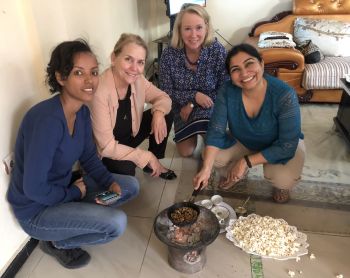
“She was a young surgeon when I was in medical school,” recalls Gail Rosseau, MD ’85, clinical professor of neurological surgery. “I admired her, respected her, and wanted to be like her.”
When Rosseau first met Bass, she was working as an ICU nurse at GW Hospital on weekends and taking medical school classes during the week. Bass, she says, exemplified what it means to be a good surgeon and how to do so as a woman. “It’s thanks to her I had that role model from the beginning, a female surgeon who was competent and kind,” Rosseau says.
While COVID-19 and the effort to ensure racial justice are taking up much of Bass’ time, she remains focused on expertly managing the wide range of responsibilities that come with her titles, including being fully committed to advancing medical research. During her career, her research work included computational surgery, health services research and outcomes sciences, and clinical trials in surgical oncology, as well as decades of bench research in gastrointestinal biology.
Today, robust research is more important than ever. From the creation of a COVID-19 specimen bank to research into the best methods of testing, health professionals across SMHS and GW MFA know they can count on support from Bass in every facet of their work.
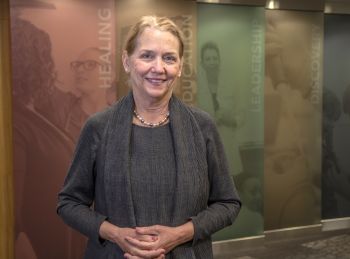
Bass is also involved in daily conversations with SMHS leadership to make decisions on educational priorities, meeting with deans and faculty members to discuss online learning options, changes in schedules for clinical rotations, and what learning will look like in the days and months ahead. And she makes time to be there for students. She has addressed students, including graduates in the Class of 2020, to encourage them to embrace the challenges that await them.
While Bass’ schedule is more demanding than ever, she still makes time for hobbies she loves, including gardening, swimming, and even caring for a colony of bees. In fact, she says, everyone in her family — sons Wes and Wyatt, and husband, Richard — enjoys the outdoors.
While some of the hopes and plans Bass had been anticipating on her first day have been put on hold for the time being, they have not been completely forgotten.
“I feel a great sense of purpose,” she says. “And I hope to continue to bring to GW my endless sense of optimism. Positive thinking can carry you a very long way, and positive thinking linked to positive actions and positive change is hopefully going to be the defining spirit here over the coming years.”

